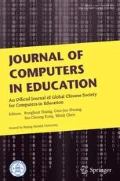Abstract
ICT has been viewed as a tool to support curriculum re-design and teachers’ pedagogical beliefs shift from teacher-centred to student-centred. While schools are being equipped with varied array of ICT tools, ICT has not successfully brought the shift in pedagogies to student-centred models in many countries. As the use of ICT in education gains traction within formal education, teaching and learning are framed as two overlapping and interconnecting sets of processes—transfer and deepening. The two sets of processes are not operating independently, for they are mutually reinforcing and iteratively enhancing learning. To conclude, the paradigms of ‘craft’ and ‘industrial’ educator are introduced as a suggested means of lensing the role of teachers in ICT-mediated learning environments.
Similar content being viewed by others
References
Bergmann, J., & Sams, A. (2012). Flip Your Classroom: Talk To Every Student In Every Class Every Day. Highlands Ranch: International Society for Technology in Education.
Chai, C. S. (2010). The relationships among Singaporean preservice teachers’ ICT competencies, pedagogical beliefs and their beliefs on the espoused use of ICT. The Asia-Pacific Education Researcher, 19(3), 387–400.
Chen, C. H. (2008). Why do teachers not practice what they believe regarding technology integration? The Journal of Educational Research, 102(1), 65–75.
Culpepper, P. D., & Finegold, D. (Ed.) (1999). The German skills machine: sustaining comparative advantage in a global economy. New York: Bergahan Books.
Ertmer, P. A. (1999). Addressing first-and second-order barriers to change: Strategies for technology integration. Educational Technology Research and Development, 47(4), 47–61.
Ertmer, P. A. (2005). Teacher pedagogical beliefs: The final frontier in our quest for technology integration? Educational Technology Research and Development, 53(4), 25–39.
Hung, D., Lim, K. Y. T., Chen, V., & Koh, T. S. (2008). Leveraging online communities in fostering adaptive schools. International Journal of Computer-Supported Collaborative Learning, 3(4), 373–386.
Jacobson, M. J., So, H. J., Teo, T., Lee, J., Pathak, S., & Lossman, H. (2010). Epistemology and learning: Impact on pedagogical practices and technology use in Singapore schools. Computers & Education, 55(4), 1694–1706.
Koh, T. S., & Lee, S. C. (Eds.) (2008). Information communication technology in education: Singapore’s ICT masterplans, 1997–2008. Singapore: World Scientific Publishing Company.
Lim, C. P. (2007). Effective integration of ICT in Singapore schools: Pedagogical and policy implications. Educational Technology Research and Development, 55(1), 83–116.
Lim, C. P., & Khine, M. (2006). Managing teachers’ barriers to ICT integration in Singapore schools. Journal of Technology and Teacher Education, 14(1), 97–125.
Liu, S. H. (2011). Factors related to pedagogical beliefs of teachers and technology integration. Computers & Education, 56(4), 1012–1022.
Prais, S. J., & Wagner, K. (1983). Some practical aspects of human investment: Training standards in five occupations in Britain and Germany. National Institute Economic Review, 105(46), 46–65. (http://ner.sagepub.com/content/105/1/46.full.pdf).
Prestridge, S. (2007). Engaging with the transforming possibilities of ICT. Australian Educational Computing, 22(2), 3–9.
Prestridge, S. (2012). The beliefs behind the teacher that influences their ICT practices. Computers & Education, 58(1), 449–458.
Sutherland, R., Armstrong, V., Barnes, S., Brawn, R., Breeze, N., Gall, M., & John, P. (2004). Transforming teaching and learning: Embedding ICT into everyday classroom practices. Journal of Computer Assisted learning, 20(6), 413–425.
Teo, T. (2008). Pre-service teachers’ attitudes towards computer use: A Singapore survey. Australasian Journal of Educational Technology, 24(4), 413–424.
Teo, T., Chai, C. S., Hung, D., & Lee, C. B. (2008). Beliefs about teaching and uses of technology among pre-service teachers. Asia-Pacific Journal of Teacher Education, 36(2), 163–174.
Tondeur, J., Hermans, R., van Braak, J., & Valcke, M. (2008). Exploring the link between teachers’ educational belief profiles and different types of computer use in the classroom. Computers in Human Behavior, 24(6), 2541–2553.
Tüzün, H., Yılmaz-Soylu, M., Karakuş, T., İnal, Y., & Kızılkaya, G. (2009). The effects of computer games on primary school students’ achievement and motivation in geography learning. Computers & Education, 52(1), 68–77.
Vygotsky, L. S. (1978). Mind in society: The development of higher psychological processes. Cambridge: Harvard University Press.
Windschitl, M., & Sahl, K. (2002). Tracing teachers’ use of technology in a laptop computer school: The interplay of teacher beliefs, social dynamics, and institutional culture. American Educational Research Journal, 39(1), 165–205.
Xu, W., Wee, L. L. K., Lee, T. L., Lim, A. P., Goh, J. G. H., & Ong, C. W. et al. (2012). Computer models design for teaching and learning using easy Java simulation Presented at the world conference on physics education on the role of context, culture and representations on physics teaching and learning, Istanbul, Turkey 1–6 July 2012.
Author information
Authors and Affiliations
Corresponding author
Rights and permissions
About this article
Cite this article
Cheah, H.M., Lim, K.Y.T. Mediating approaches to the use of ICT in teaching and learning through the lenses of ‘craft’ and ‘industrial’ educator. J. Comput. Educ. 3, 21–31 (2016). https://doi.org/10.1007/s40692-015-0049-7
Received:
Revised:
Accepted:
Published:
Issue Date:
DOI: https://doi.org/10.1007/s40692-015-0049-7




